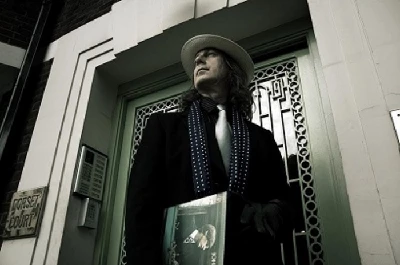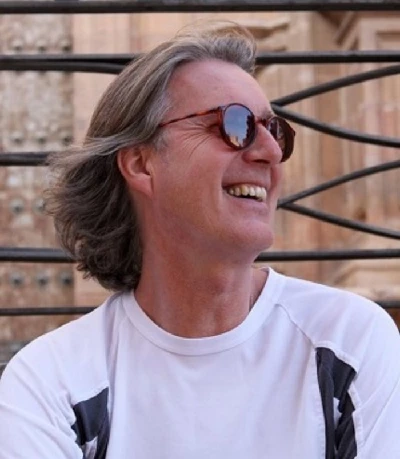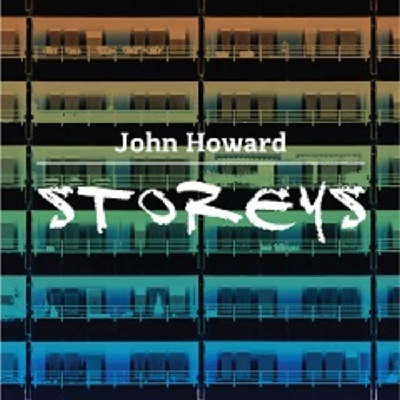published: 14 /
12 /
2013

In 1975, CBS Records released 'Kid in a Big World' – a sumptuous fusion of glam-rock, sixties pop and orchestral showtunes. It was the first album by John Howard, a singer songwriter who had learned h
Article
In 1975, CBS Records released 'Kid in a Big World' – a sumptuous fusion of glam-rock, sixties pop and orchestral showtunes. It was the first album by John Howard, a singer songwriter who had learned his craft in the folk clubs of Northern England but whose vision was far more ambitious, and was recorded by Shadows drummer Tony Meehan.
The album flopped – the BBC refused to release the album's two singles, branding the melancholic 'Goodbye Suzie' “too depressing”, despite its singalong chorus and rejecting the follow-up, “Family Man” on the mystifying grounds that it was “anti-woman”. Howard's friend have since told him that the real reason was that the BBC remained uncomfortable with a gay man who made no attempt to hide his personality under a more traditionally 'masculine' image.
The album was formally deleted in 1978, and looked destined to be forgotten for good. Howard had been commissioned to record two more albums' worth of songs, but the label rejected both. Though he later worked with Trevor Horn and Steve Levine on a handful of singles, Howard's career was over by the mid 1980s. Instead, he worked in A&R – helping bands like Madness have the kind of chart success he never enjoyed himself.
And then something unexpected happened. With an increasing craze for discovering 'lost' albums, fostered enthusiastically by publications like ‘Uncut’ and ‘Mojo’ giving as much attention to old albums as to new, John Howard found himself being followed by a cult fanbase. There was enough interest to justify a reissue, on Cherry Red's RPM imprint. Giving the album five stars in ‘Uncut’, Paul Lester wrote, “A magnificent collection of rococo balladry and florid vignettes from a singer/songwriter who might have rivalled Elton or Bowie. What a discovery!”
In this second half of his interview with Pennyblackmusic, he tells us about his return to songwriting thirty years after the release of his first single. He explains that, if he didn't think anyone wanted to hear them, he wouldn't want to write songs.
JH: I loved your comment in the review you wrote for Pennyblackmusic about the origin of the word 'amateur' – I didn't know that, amateur meaning 'to love', I think that's a wonderful thing.
PB: I think it's often used almost an insult – to mean shoddy or unrefined. But, actually what the word can mean is someone who does something for the love of it, rather than because they have to, because it is a job.
JH: My partner, Neil France, is an actor. He has retired now. He always said, the only difference between amateurs and professionals are that amateurs don't get paid – the only difference.
PB: Obviously, there are people who do things as amateurs who would love to be professionals, but it doesn't have to be the case that one is better than the other.
JH: No, and I've been through both. I've done the whole 'signed to CBS, you have to be here at a certain time and look a certain way'. I did all that. To a degree, I did that again when 'Kid in a Big World' was reissued, because there were things that we had to do to promote it. Now, I am in a happy position of being able to do as I like.
I mean, people do buy what I do. It isn't 'vanity publishing', if you like. That is a different world – where you just do things because you want to do them and that's that. For me, the only reason I am doing what I am doing is because people are interested. People are buying what I'm doing. I stopped doing it in the 80s because people were no longer interested. They weren't buying it. So I stopped – I didn't write, I didn't record. I had no interest, because there was no interest.
I read an interview with Paul Simon once, and he said that the only time he wrote and recorded was when the record label rang up and said they needed another album. And, in a sense, it's the same with me, but it's me saying it to me. The fact that people like my music is amazing.
And some great things have happened around my music – that does give me the impetus. I think the interest I have had recently from Robert Rotifer and Ralegh Long is one of the reasons I went straight from one album to working on a new one straight away, because it fires me up, when you know there is interest. I couldn't do what the Prefab Sprout chap does, make an album and put in a box, and make another album and put that in a box. I think that would just kill me.
PB: You want someone to actually be listening to it at the end of it?
JH: Well of course. Otherwise, what's the point? And don't forget that I had two albums on my shelf, unheard, for thirty years. I was really proud of them at the time, full of songs I was proud of, and nobody heard them, apart from my manager and the people at the record company who turned them down.
So I have been through that – just looking at your albums on the shelf, and nobody gives a damn about them. So the fact that I could get those out there again then kick-started me back into writing – and it was only because there was interest again.
PB: There had been increased signs of interest in your music for a few years, which lead up to 'Kid in a Big World' being reissued. At what point during all of that did you sit down at a piano and start to write again? Was it only after the reissue was available, and that dust from that had settled, or was it before that album came out for the second time?
JH: Well, basically, my partner and I basically retired from everything in 2000. We moved from Oxfordshire, where we had lived, to Pembrokeshire. We had a big house, loads more space than we had been used to, and my father, as a house-warming present, bought me a baby grand piano, and I hadn't had a piano in years. I hadn't even touched one for years.
He bought me this, and I just stated tinkling away at it. It felt quite strange at first. But a few songs did start to come along at that point – I actually demoed some of them. I went into a little studio in Pembrokeshire, and recorded four or five songs, just to see how I felt about it and whether I still enjoyed it. I found that I very much did.
That was around about 2001 and 2002, when at the same time, people began to talk about my music on the internet. I started to have a few people email me, and say that they had found copies of my album in rare record shops, saying that they didn't know who I was, but they loved the album. And then, I found this website saying “Who is John Howard? Is he dead?” (Laughs). But, it was when ‘Kid in a Big World came out, and Cherry Red, who owned RPM, expressed an interest in a new album. At that point, I started to think more seriously about this, and wrote songs for a new album, 'As I Was Saying', which Cherry Red released.
But what happened was like somebody had opened a wardrobe and it just poured out. I wrote so much material. I did a second album of my own songs, 'Same Bed, Different Dreams' and also recorded 'The Dangerous Hours', which was a collaboration with a poet, Robert Cochrane, who I met at my London gig. We wrote that album together, and Robert brought it out on his own label, The Bad Pressings.
And once that started, I got reviews like I had never had in my life. I think I had only had two dreadful reviews in ‘Disc’ and Music Echo, and that was it. But to get a five-star review in ‘Uncut’ and to get reviews in ‘The Guardian’ for my gig, that is really when it all started. The whole creative thing came back – and I just couldn't stop writing. I just loved the process of recording – and getting them released, that was the thing. Having an actual CD of songs you'd finished in your hand, not just hundreds of demos sitting on a shelf.
PB: It must have been an odd sensation to have, essentially, your childhood ambition fulfilled – having nearly got there before, not quite reached it and previously given up on it.
JH: When I did my first show, after the reissue, it felt like I'd found an old suit in the back of a cupboard. It felt quite strange. But as soon as I walked out on to the stage, and the audience was sitting there, it was like I'd never been away. I was twenty again in my head – it was great. A sensation of feeling young again, vibrant and creative again. I had spent quite a few years working in A&R, putting together concepts. But, to be back in the driving seat again, working on my own songs and not other people's, felt great.
Paul Phillips, who I worked with back in the seventies, said to me, “You know, a lot of people who went through what you went through with ‘Kid in a Big World’. The whole experience of being told you would be a star, and then noone wanting to talk to you – a lot of people would have gone mad, and disappear into an abyss of drink and drugs.” I think, luckily, I've been a person who has just got on with things, and when something hasn't worked I have moved on. That is what has kept me sane.
PB: It felt like you were making the kind of music you would have made in the 70s...
JH: I think that's why I called 'As I Was Saying' the “comeback” album, because that is what it felt like. Like I opened the door and everything I wanted to say then came out.
Also, I think that within myself, I rejected the 80s, musically. There were things I did like – I used to love Scritti Politti and I did like Prefab Sprout, Prince was an amazing artist – but the digital recordings, and that whole 'clean and crisp' thing, it just left me cold.
I did try and do some disco things, I recorded with Trevor Horn and some other producers then, but it never really felt like me. It was almost like singing on someone else's project. That's not to downgrade them – they did their best to get me into the studio and sing, when I was saying “Come on I'm not really interested”. And I did try writing for some others – you mentioned the song I wrote for Des O'Connor in your review. (Laughs) Actually, that was almost a hit, I think it got to about 73. It bubbled under for a few weeks!
In a sense, that might make you think I was just an old grump, not moving with the times. But it was only when I got back into what I am doing now that it felt right. And I think that means that fans of 'Kid in a Big World' like what I am doing now, and new people have come along and gone back and bought the older stuff, and I don't see a huge difference.
Of course, production wise, there is a big difference, and I think the 'Kid in a Big World' songs sound young – quite naïve in many ways. But, for their time, I think they work really well.
BH: Another interesting thing is that your voice doesn't seem to have changed a great deal. That's not the case for some of your contemporaries...
JH: No, it hasn't, luckily. In fact, I think my lower range is better. I used to find singing in a lower range in my twenties quite difficult and now it is much better.
I revisited some of those songs on my last album. My initial response was that if I couldn't sing those songs in the original key I wouldn't do it. The first song I tried was 'Technicolour Biography', and I was amazed at how easy I found that to sing. It has a big range. But I think it is because, over the last ten years, I have rarely stopped singing. Even when I have not been writing an album, I have done EPs of covers, so I've not had big breaks where I don't sing.
But what I haven't done is play many gigs. I think gigs are more liable to screw your voice up. Also, I don't smoke or anything like that. So, I think I have benefited from not overdoing it. I think if I started to feel that my voice was going I would stop. I wouldn't be able to cope with expecting people to listen to bad singing, just because of my age.
BH: I think I am drawing to a close, but there were just a couple other things I wanted to ask about. For your albums now, you release them on your own label, and also do the promotion and much of the distribution yourself. What are the upsides and downsides to doing that?
JH: I worked with several levels, but I really wanted to have more control. God bless those people for releasing the albums – what they did meant so much to me and springboarded me into what I am doing now. It was actually Mark Stratford from RPM who suggested that I should get in touch with AWOL, who do digital releases of music. So, I got in touch with them and they put out a couple of my albums. I just love the process – I decide the release date, send them the sleeve and the tracks to be uploaded, and then a few weeks later, they are up on iTunes and EMusic, and they are out there. That has worked so well, and then it just made sense to sell the CDs through the website. Why not?
I'm a bit of a control freak, anyway. I enjoyed the process so much, working personally with the sleeve designer and agreeing the release date, so you can decide the timings. I also like the intimate side of the website, which means that people contact you directly and you can sign their CDs for them.
The downside is that you don't have a marketing department or anyone helping with the promotion – I don't have an agent or manager, or anything. So nothing is done for you if you don't do it – but I can cope with that. I rely on people like Joe Lepper, Robert Rotifer – people who spread the word. That's great.
The old days of swanning into Abbey Road and recording, and playing the same Mellotron John Lennon played, and then having a press person doing all of that work for you – it was great fun. But for me, the end result was the same. It was an awful lot of work and an awful lot of dreams, but nothing ever came of it. Now my only ambition is to write and record good songs that people want to buy. It's a good position to be in – I'm in a very good place.
BH: One final question – I'm imagining someone who is reading this interview, and has perhaps started with the new album 'Storeys'. Where would you say to go next?
JH: Certainly, I think ‘You Shall Go to the Ball’ is worth anybody investigating, because it takes in the past and the future all in one go. For that, I took the older songs, which were recorded in the 1970s, but were never finished and never had string arrangements or anything like that. And then, those are encased with new soundscapes – it's an interesting journey. It's like an old concept album – every song is linked. It's also an interesting contrast to 'Storeys', which was a twelve song pop album. ‘You Shall Go to the Ball’ is something entirely different.
Otherwise, I think ‘Exhibiting Tendencies’ is the album most like ‘Storeys’. That came out in 2011. And, of course, if people want to go right back – ‘Kid in a Big World’ is still an album that I am very proud of.
PB: Thank you.
Picture Gallery:-

